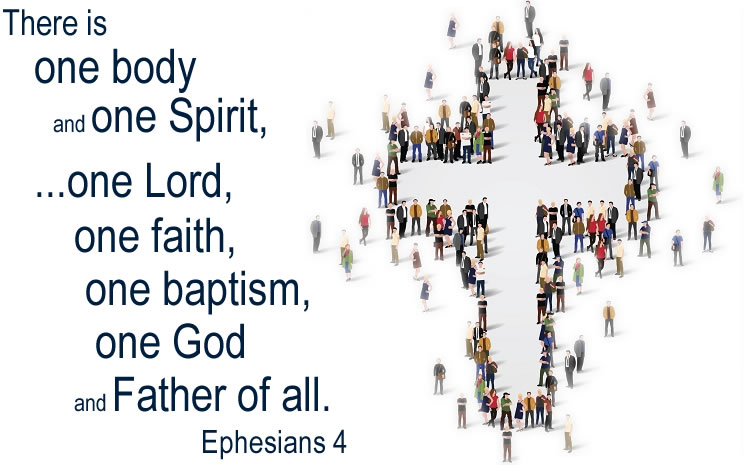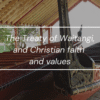“Make every effort to keep the unity of the Spirit in the bond of peace”
– so how are New Zealand churches going on that?
It is no secret that Jesus told his followers to “love another”, that he prayed that believers “all may be one”, and that he indicated such unity would be a great witness to a watching world. Also, Ephesians 4 reminds us that we all share the same Lord and are all part of the same worldwide spiritual body of Christ: “There is one body and one Spirit, …one Lord, one faith, one baptism, one God and Father of all”.

The principles of unity are clear enough. In reality, though, seeing and practising that unity is a lot more difficult. So the scriptures also say to us that we have to work hard at getting on well together. They also constantly teach us about humility and gentleness, forgiveness and reconciliation, respect and encouragement – attitudes and behaviours which reflect the mind of Christ and the fruit of the Holy Spirit. As it also says in Ephesians 4: “Be completely humble and gentle; be patient, bearing with one another in love”, and “Make every effort to keep the unity of the Spirit through the bond of peace”, and “Be kind and compassionate to one another, forgiving each other, just as in Christ, God forgave you”.
The main obstacle to Christian unity is not that we lack a biblical theology of unity, but our failure to live it out. Human nature is intrinsically self-centered. Even as Christian believers we do our own thing and don’t necessarily care too much about others.
So what are some of the obstacles to Christian unity in Aotearoa New Zealand today?
OUR OWN BUSYNESS
We are generally too busy coping with our own concerns and all the demands of our own ministries to be investing time and energy into relating to Christians beyond our immediate circles and context.
DENOMINATIONALISM
Our denominations tend to confine us as Christians into narrower boundaries. Too easily we idolise denominational distinctives, and make them more important than relating across the body of Christ. The church in New Zealand appears increasingly fragmented.
THEOLOGICAL DIFFERENCES
While most Christians would affirm the same basic tenets of faith, such as there is one triune God and Christ is Lord and Saviour and risen from the dead, and most would assent to the Apostles Creed, there are nevertheless some profound differences of belief and practice among Christians. Some may hold loosely to biblical orthodoxy, and many others may emphasise points of the faith that are secondary. The Church in New Zealand has various overlapping streams: liberal, traditional, liturgical, mainline, evangelical, charismatic and Pentecostal, and many people in each of those streams are not particularly eager to have much to do with those Christians who are in other streams, and regard them as suspect or defective in some way. There is some distrust between these different Christian streams of faith and practice.
TRIBALISM
Human beings are incurably tribal. We like to mix with people like us and do things our own way. That is why the dreams of Church union (which climaxed in the 1960’s plan for mergers to create a mega denomination) all came to nothing.
EXCLUSIVITY
Various attempts at creating national inter-church bodies in New Zealand have all struggled because, theologically and ecclesiastically, they failed to be sufficiently inclusive. The National Council of Churches and the Conference of Churches of Aotearoa New Zealand, for instance, did not include Pentecostals or smaller evangelical denominations, and the new National Council for Christian Unity includes just four denominations.
FUNDING
Denominations all agree unity is good, but are unwilling to give funding to support organisations working for Christian unity.
GEOGRAPHY
New Zealand is a long thin country and it is not easy to maintain relationality across the length of the whole nation.
CULTURAL DIFFERENCES
New Zealand is a mix of many different cultures and traditions and these add to the fragmentation of our Church. There are many churches in New Zealand which reflect migrant groups that, very understandably, prefer to worship together in their own way.
Unity is not just a matter of institutions and structures and mergers. It’s primarily an attitude of the heart and a work of the Holy Spirit. In Christ, all believers are called to unity, unity of spirit, which is something we are not always doing well. “Make every effort to keep the unity of the Spirit in the bond of peace” gives us what we need to do. How can we rise to that challenge?
Dr Stuart Lange, interim National Director, NZCN
Adapted from reflections shared with the National Church Leader’s meeting, September 2018.









0 Comments